Damien Glez (b. 1967) was born in France but moved to Burkina Faso in 1990. His cartoons are being published in several magazines and newspapers. Among others, he has won the 2002 “African Cartoonist of the Year Award”. I asked him a couple of questions about being a cartoonist in Africa.
Damien, can you tell me how you decided to move to Burkina Faso?
I originally went there to teach German for two years – I was working for an NGO then. In June 1991 the state of emergency officially ended and the 4th Republic was established. As a consequence people were allowed to publish private newspapers, magazines, etc. One of these magazines was Le Journal du Jeudi, a satirical weekly that would become my stepping stone towards full-time cartooning. I think I would have never become a professional cartoonist outside Africa.
Why do you think so?
If I had stayed in Europe, I would have never had enough confidence in my drawing skills. I would have never offered my cartoons to a magazine. If I had returned to Europe, I’m sure I would have continued on the path set by my education – I would have ended up in business. In Burkina, cartooning was a virgin territory. The period right after the end of the revolutionary regime was really exciting and so I decided to plunge right into cartooning.
I noticed that you are drawing cartoons about several African countries and you also draw for a magazine called “Jeune Afrique” – i.e. something presumably not exclusively Burkina Fasoan. What are your reasons for taking such a Pan-African view?
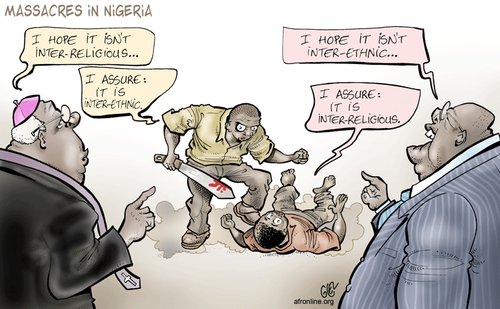 All the news about Africa is exciting for me. Somehow, if you love Africa, Africa is like one country. Well, not really, of course, as far as politics is concerned.
All the news about Africa is exciting for me. Somehow, if you love Africa, Africa is like one country. Well, not really, of course, as far as politics is concerned.
My cartoons are published in Africa, Europe and North America but “Pan- African” publications are important for me and African news is the news I’m drawing about every day. I’m a regular contributor to “Jeune Afrique”, “Continental”, “Afrique Magazine” and “The Africa Report”.
Do you use different styles of humor for the different publications you’re working for?
Yes. In a satirical magazine, for example, you can be a lot more “trashy” than in a normal newspaper. It’s not so much about adapting yourself to your audience but about avoiding to be counterproductive. Taboos aren’t the same all over the world. In a prudish region like the Sahel, a bawdy cartoon on sex would be inappropriate.
You also need consider that symbols and images aren’t always understood in the same way. If I put a cockroach [un cafard] in a speech bubble, people in France will know that the character depicted is depressed. In the United States they won’t.
Is there something like a Pan-African organization of cartoonists or some informal network?
Many African artists know each other, and they get together at festivals. But a Pan-African association of cartoonists hasn’t come into being yet. “Cartooning for Peace”, an association where I’m a member, also offers some opportunities to meet each other.
What do you think about the way African states are being represented in international cartoons? Is there something you would like to change about it?
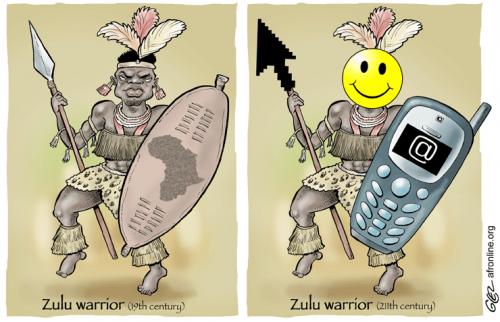 In general, Western media tend to represent Africa as a pretty miserable place. They hardly report about things other than famine, war, and corruption. Unfortunately, as editorial cartoonists we have no other choice but to point out bad things. African artists can’t draw the beautiful touristic landscapes when they depict the political situation in Guinea, Nigeria or in Sudan.
In general, Western media tend to represent Africa as a pretty miserable place. They hardly report about things other than famine, war, and corruption. Unfortunately, as editorial cartoonists we have no other choice but to point out bad things. African artists can’t draw the beautiful touristic landscapes when they depict the political situation in Guinea, Nigeria or in Sudan.
When it comes to international cartoons about Africa, you might complain about everlasting clichés like starving children or Zulu warriors. But people abroad need to see that African cartoonists fall victim to clichés about Westerners or Asians just as well. Clichés and stereotypes sometimes are inescapable tools for cartoonists.
Thanks for your time!
© toonpool.com
Tags: Africa, Burkina Faso, Damien Glez
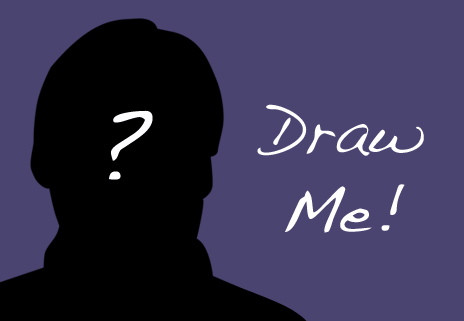
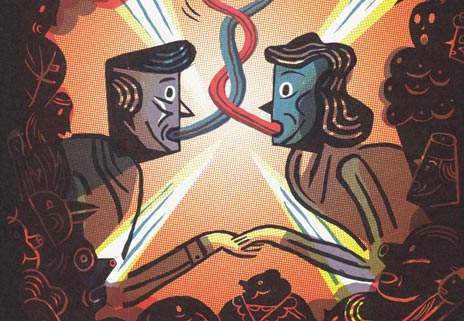
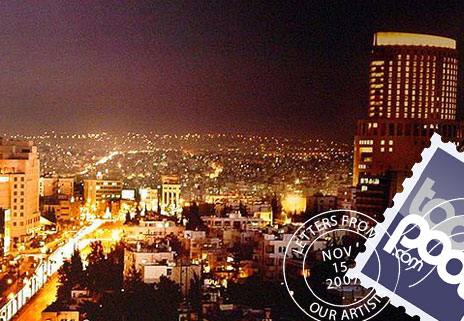
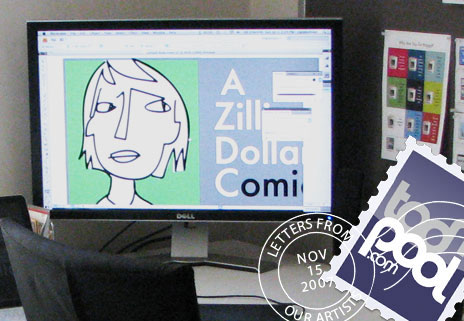
Very interesting. I guess the starving children cliché will never grow old. There are many people in Western countries who want to “help”, no matter whom or what kind of. An ambiguous topic.
Interesting biography (France -> Burkina Faso)… and thanks for the ajective “burkina-fasoan”
“thanks for the adjective ‘burkina-fasoan’”
It seems that that one doesn’t really exist. Damien uses “Burkinabè” and Wikipedia tells me that people there don’t really like other terms – apparently they made anglophone countries change the official term from Burkinian to Burkinabè.
oh, well.